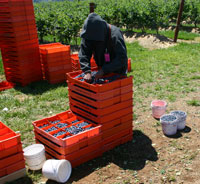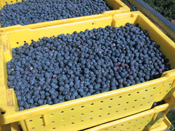
|
In the wake lay three farmers who are out close to a combined $200,000 and left with very little regard for USDOL.  Essentially, the department, using methods that have since been proven faulty, charged under the Fair Labor Standards Act that all three farms had not paid so-called “ghost pickers” for berries harvested. Essentially, the department, using methods that have since been proven faulty, charged under the Fair Labor Standards Act that all three farms had not paid so-called “ghost pickers” for berries harvested. These fantasized pickers, said USDOL, were turning in their berries on another person’s ticket and not getting paid for their work. Subsequently, USDOL decreed that before the farms could release their berries, which had been labeled by the agency as “hot goods,” they had to sign consent papers stating they were guilty and agree to pay severe cash penalties and alleged back wages. One of the disgruntled growers, a third-generation Silverton farmer who had to pay close to $170,000 in back wages and penalties, called the department's action “extortion.” Leading the way in representing the maligned growers has been the Oregon Farm Bureau (OFB). Among other things, OFB conducted its own study that showed conclusively that even average blueberry pickers can harvest much more than the 60 pounds-per-hour claimed by USDOL. This is crucial to the issue since the Department of Labor alleged that any tickets exceeding that rate must have been helped along by the “ghost pickers,” whom USDOL said never got paid and whom, by the way, have never materialized. What makes the matter even more frustrating is that it’s perfectly legal for pickers to share tickets. While attorneys for the growers are working to right this wrong, Katie Fast, OFB director of governmental affairs, said that there doesn’t seem to be much recourse since they all signed the consent papers, this despite the fact that the signatures were obtained under duress. In effect then, the harvested berries were held hostage. OFB agricultural HR consultant Roberta Gruber said that growers can best prepare themselves to handle USDOL payment controversies by conducting their own picking experiments, or time studies, and document how many pounds per hour pickers can harvest.  And even though the grower who paid the highest USDOL penalties practiced this, growers should also insist that pickers pick on their own ticket only. And even though the grower who paid the highest USDOL penalties practiced this, growers should also insist that pickers pick on their own ticket only.Finally, because there was an issue with a child being in the fields during the USDOL farm sweep, Gruber tells growers to make sure there are no children under the age of 12 in the fields at all times. Also, children over 12 should have their own picking ticket. Gruber said that given optimum harvest conditions, some pickers can make up to $60 an hour. Katie Fast, OFB, said that USDOL had targeted blueberry farms in July for a week and may return later before the end of the season for another round of inspections. “Winegrapes might be a target (also).” Both Fast and Gruber said that USDOL serves a useful purpose in protecting farm laborers, “but the method they used this time was over the top, ridiculous,” said Gruber. “The Oregon Farm Bureau has taken the lead on this,” Gruber said. “We’re still there, still hammering it.” What frustrates her, she said, is that the growers “were following the law. They were doing everything I would recommend everyone else do. It’s the most bizarre event I’ve ever experienced.” |
Smooth Move Into South Korea Oregon Blueberry Promotions Busy Last Summer NWEA Seeks Pesticide Streamside Buffer Zone USDOL Actions Leave Heavy Fines, Angry Growers in Wake Organic Blueberry Production Systems Research Highlights and Future Plans Some Do's and Don'ts of Drip Irrigation |